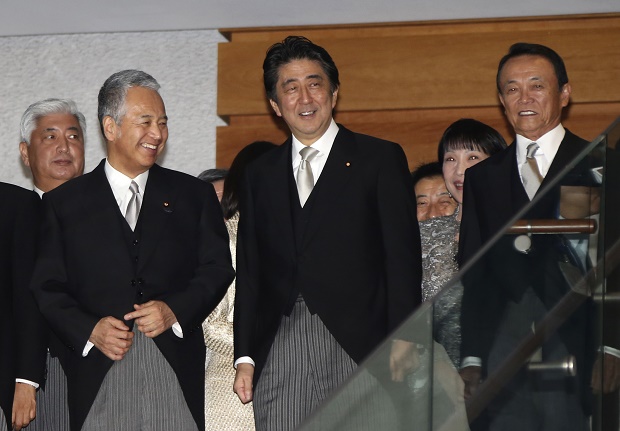
Japanese Prime Minister Shinzo Abe, center and his new cabinet members, from left, Minister of Defense Gen Nakatani, left, Minister in charge of Economic Revitalization Akira Amari, second from left, and Minister of Finance Taro Aso, smile before a photo session of new cabinet members at the prime minister’s official residence in Tokyo, Wednesday, Oct. 7, 2015. Japanese Prime Minister Shinzo Abe has reshuffled his Cabinet to focus on reviving the world’s No. 3 economy. AP Photo
TOKYO, Japan—Japanese Prime Minister Shinzo Abe reshuffled his Cabinet on Wednesday to focus on reviving the world’s No. 3 economy, adding a new minister to coordinate recently announced economic projects.
New government minister Katsunobu Kato will steer programs aimed at strengthening the economy and increasing the birthrate so the population stabilizes and the country can stay afloat. He will be responsible for overseeing and coordinating projects that involve multiple ministries.
READ: Second Japanese female cabinet minister resigns – PM Abe
Finance Minister Taro Aso, as well as the defense and foreign ministers, will retain their portfolios, while nine ministers were replaced.
The reshuffle comes as Abe turns to the economy after pushing through unpopular security legislation last month—a move perceived as an attempted diversion from the security legislation that had triggered heated public protests.
Abe vowed to stabilize the population at 100 million to build a society where all Japanese contribute. After years of steady decline, Japan’s population is now 126 million. The idea is to promote “a society where all 100 million people are active,” Abe said.
“It’s a challenging task, but we’ll do our utmost,” Abe said. “We definitely cannot leave alone the problem of low birthrate and aging population.”
Abe promised to compile a set of measures by the end of this year under Kato’s leadership.
He also said helping women’s advancement, or “Womenomics,” remains key to his efforts to boost the economy. The reshuffle reduced the number of female Cabinet members by one, with three women now among the 19 ministers.
Among the measures he had introduced are cash allowances to induce companies to use affirmative action. The government’s ambitious goal is for women to hold more than 30 percent of jobs in every economic sector.
Improvements have been made but further effort is needed, Abe said. He said shorter working hours and more flexible work style could benefit everyone.
The programs in Kato’s portfolio are based on new economic policies announced last month, including a GDP target of 600 trillion yen ($5 trillion), and a target birthrate of 1.8 children per women from the current very low rate of 1.4. Abe also vowed to increase support for child rearing and measures to lighten the burden of elder care “so that nobody has to leave their jobs because of full-time burden of taking care of their families.”
Japan’s economy contracted at a 1.2 percent annual rate in the April-June quarter. Experts say achieving Abe’s goal would be a stretch at Japan’s recent pace of growth. It was unclear how those projects could be funded, given Japan’s tight fiscal conditions.